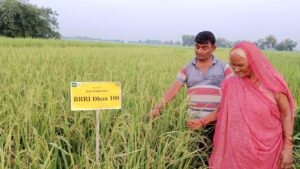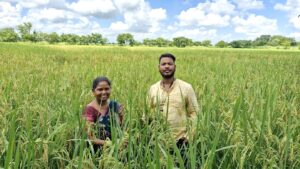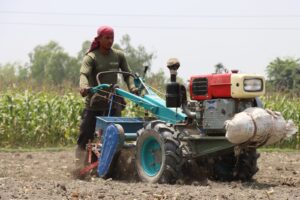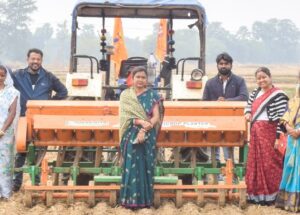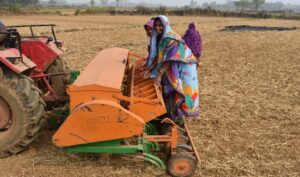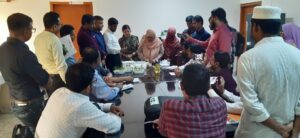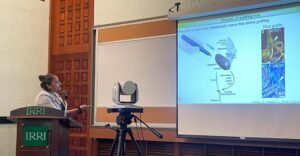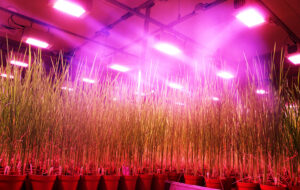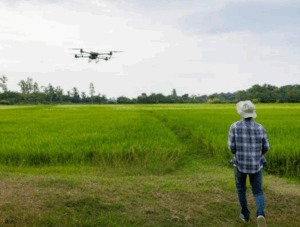Reminiscing about his early years, Baboucarr Manneh said that his first experience with research was a few months after high school in 1988. He served as a hatchery assistant in an aquaculture lab where he looked after the development of tiger shrimp larvae.
Dr. Manneh liked this experience so much that he applied for an honors program in marine biology. “But, as fate would have it, I ended up getting a scholarship to study general agriculture and eventually studied plant breeding and biotechnology—with a focus on rice,” he said.
Since seafood and rice are especially popular in The Gambia—the smallest country on mainland Africa—it is not surprising that Dr. Manneh’s research experience encompassed both, albeit at different stages of his career.
A lover of nature and science
Born to a farming family in a small village called Sukuta, Dr. Manneh has always been fascinated with the beauty and diversity of nature. Quite aptly, his favorite subjects were biology, chemistry, and agriculture. “It was my desire to apply an understanding of biological processes to improve living systems that drove me to study biotechnology,” he said.
His farming roots helped him understand that science is not only a tool to uncover the mysteries of nature but that it also provides a powerful means of helping people and improving their lives. His profession as an agricultural scientist gave him an opportunity to help farmers through research.
For Dr. Manneh, working with farmers is both enjoyable and humbling. He is most touched when farmers genuinely appreciate the efforts of scientists and extension workers to improve their livelihoods. “They are often willing to offer their last chicken to a visiting agricultural officer,” he remarked. “Therefore, no amount of effort is too much when we are trying to assist such appreciative people.”
A serious worker
After finishing his bachelor of science degree, Dr. Manneh joined the National Agricultural Research Institute (NARI)—The Gambia’s main agricultural research institute—first as an assistant research officer in the Agricultural Engineering Unit and then in the Socio-economics Unit. Part of his work was to help develop and evaluate postharvest equipment for rice and coarse grains and to conduct socioeconomic surveys on the adoption of improved agricultural technologies.
Since Dr. Manneh was keen to continue his studies, he was granted a study leave by NARI to follow a master’s program at Wageningen University in the Netherlands, specializing in crop breeding. On his return, he was appointed head of the Cereals Research Program at NARI and became a manager for the Sapu Agricultural Station—the biggest regional agricultural station in the country.
Dr. Manneh was very serious and hard-working and we were sure that he was going to succeed in his career,” said Dr. Samuel Bruce-Oliver, who was heading NARI at that time. “We were also impressed with his skills in managing the Sapu station, which hosts more than a hundred research and extension staff with their families as well as other government officials and R&D partners.”
Thanks to NARI’s help, Dr. Manneh was able to pursue advanced studies on genetic, physiological, and modeling approaches toward salinity tolerance and low-nitrogen supply in rice when he was awarded a PhD sandwich fellowship by Wageningen University in 1998. He conducted his PhD research with awards from the Netherlands Organization for Scientific Research and the International Foundation for Science.
Rising through the ranks
Dr. Manneh continued to be associated with NARI, where he rose to become a director of research and advisor to the Minister of Agriculture on seed and biotechnology issues.
In 2005, he joined the Africa Rice Center (AfricaRice) as a postdoctoral fellow in the Biotechnology Unit in Cotonou, Benin, where he worked closely with his team on using marker-assisted selection and conventional breeding approaches to develop drought-tolerant rice.
Drought stress causes substantial crop losses yearly in Africa, and AfricaRice is involved in developing drought-tolerant rice varieties that produce stable yields in rainfed systems in Africa.
The threat of climate change is aggravating the drought problem. “One of the most viable options to enable farmers to adapt to climate change is the use of rice varieties with good drought tolerance,” Dr. Manneh said.
After joining the Center as a postdoc, Dr. Manneh has since risen to the post of principal scientist and he is now an irrigated lowland breeder based at the Sahel regional station in Saint Louis, Senegal. Since arriving at the station in 2008, he has helped broaden irrigated lowland breeding activities there to cover breeding for high yield potential and adaptation to environmental stresses such as temperature extremes, salinity, and flooding, using both conventional and molecular breeding approaches.
An advocate for partnership
Dr. Manneh is a strong advocate for partnership. “No single research or development institution has the resources to tackle the challenges faced in converting Africa from a net food importer to a net food exporter,” he observed. Hence, his unit has established strong collaboration with international agricultural research centers and with local and regional universities to foster research and contribute to building the capacity of Africa’s next generation of plant breeders.
In view of his work experience, Dr. Manneh was the natural choice to lead the coordination of the AfricaRice component of the project “Stress-Tolerant Rice for Africa and South Asia (STRASA).” Launched in 2008, the project focuses on tolerance of five major abiotic stresses—drought, submergence, salinity, iron toxicity, and low temperature.
With funding by the Bill & Melinda Gates Foundation to the International Rice Research Institute (IRRI), STRASA involves AfricaRice and the national programs of 18 countries in sub-Saharan Africa. The project is now in its second phase.
Dr. Takashi Kumashiro, leader of the Genetic Diversity and Improvement Program at AfricaRice, spoke highly of Dr. Manneh’s efficient management of this project component, which involves collaboration across continents and time zones. “He has a very sound background in all areas of plant breeding, including molecular biology.”
Dr. Manneh is convinced that the availability of improved rice-based technologies, especially stress-tolerant varieties, would make sub-Saharan Africa’s important food and cash crop adaptable to climate change.
“When farmers are certain that the varieties they are planting are capable of tolerating stresses, they will invest more resources, time, and energy into their fields,” he said. “This in turn can help increase rice production and ultimately improve farmers’ livelihoods.”
___________________
Ms. Mohapatra serves as head of Marketing & Communications and member of the Office of the Director General at AfricaRice.

